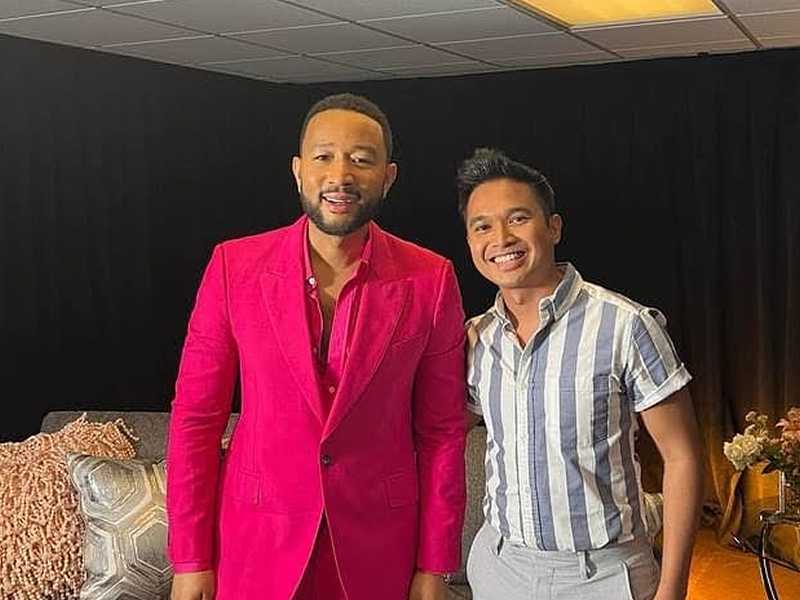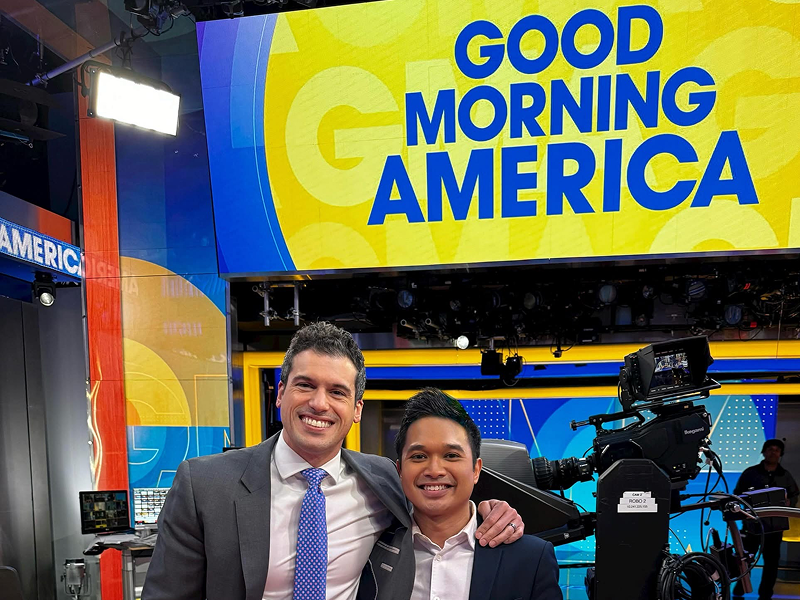As a digital news reporter for Good Morning America, Shafiq Najib reports on entertainment, human interest, and lifestyle topics. Each day, he comes up with new story ideas. These can be based on something trending on social media, someone he’s met in real life, or tips sent to him by people who want to share their story. Sometimes his editors assign him stories.
After he has settled on a story idea, he sets up interviews (either in person or over Zoom), and reaches out to sources or officials if more context is needed. Then he writes the piece.
He also covers red carpet events like movie premieres and award shows, where he interviews celebrities for both Good Morning America’s broadcast and social media platforms.
No two days are ever the same. This is what Shafiq loves most. He works on different stories every day. He meets new people, and learns about their unique experiences and backgrounds.
He also loves being able to give people a platform to share their voices, especially those who might not always be heard.
I IMAGINE THAT LEARNING ENGLISH HAS BEEN ONE OF YOUR GREATEST CHALLENGES. WAS IT A STRUGGLE?
Yes, absolutely! English isn’t my first language, so there were a lot of trial and error moments in the beginning. And in the jobs I’ve landed, I not only had to be good at what I do, but I also had to be better than native speakers, since the field is competitive, even for them. So that made the challenge even more intense.
WHAT’S THE MOST DIFFICULT PART OF YOUR JOB?
One of the most challenging parts is coordinating and producing interviews, especially when it involves high-profile figures or trying to land an exclusive.
It often requires reaching out to multiple sources, confirming details, and making sure the information is accurate and credible. There’s a lot of responsibility that comes with reporting, especially on sensitive topics, because once the story is out, we have to be confident in it and stand by every word.
WHAT DREAMS DID YOU HAVE AS A TEENAGER IN MALAYSIA?
Growing up in Malaysia, I secretly dreamed of working in television or the entertainment industry as a presenter or journalist. I used to watch Ryan Seacrest and Giuliana Rancic doing red carpet interviews on E! and imagined myself in their shoes.
But in the environment I grew up in, creative careers like those weren’t encouraged or celebrated. Instead, I kept that dream to myself and followed a more traditional path, pursuing a path in the STEM field.
WHAT ARE YOUR DREAMS NOW?
My dreams have evolved a bit as the media landscape continues to change, especially with the rise of advanced technology. But one thing that’s stayed the same is my passion for storytelling. I still love sharing meaningful stories, I’m just now exploring the best ways to reach the right audience. That might be through social media, short- or long-form content, or even reimagining traditional broadcast formats to better connect with younger viewers. Hopefully I am playing a small part in making the world a little better through storytelling.

“Hopefully I am playing a small part in making the world a little better through storytelling.”
WHAT BROUGHT YOU TO THE US?
I actually moved to the U.S. twice. The first time was back in 2011, when I came as a high school exchange student through a State Department scholarship under the AFS/YES program. It was a temporary stay, but it made a big impact on me.
The second time, I moved back here from London to pursue a career in entertainment and media.
WHAT WAS YOUR PATH FROM HIGH SCHOOL STUDENT TO DIGITAL REPORTER FOR GOOD MORNING AMERICA?
My path wasn’t exactly traditional, especially since I didn’t grow up in the U.S. I did most of my high school in Malaysia.
As I mentioned, I came here through a student exchange program. I finished my senior year of high school in California. After that, I went to Scotland to study aircraft engineering. But I quickly realized my real passion was entertainment reporting. So, I made the switch and enrolled at the London School of Journalism to start pursuing that path.
From there, I interned at a few local radio stations in London, did a short work placement at CNN, worked as a production assistant at BBC Film, and eventually got my first reporting job as a London-based correspondent for Us Weekly in 2016.
Since then, I’ve worked in different roles at a variety of outlets such as freelancing for E! News, reporting and producing for a Sinclair local news station, writing for Radar Online, and most recently, working as a reporter and writer at People Magazine before joining Good Morning America in 2023.
WHAT STEPS DO YOU SUGGEST A HIGH SCHOOL STUDENT TAKE IF THEY WANT TO BECOME A NEWS REPORTER OR ENTERTAINMENT NEWS REPORTER?
Start getting experience as early as you can, whether that’s through internships, helping out at a local newspaper, or even publishing your own work online. Don’t wait for permission to start telling stories.
Find someone you admire, someone who works at a local outlet. They don’t need to be super famous. In fact, someone less high-profile might have more time to give you valuable guidance. Look for a credible journalist who can help you learn the basics: how to write, report, and pitch a story. Start bringing them ideas, get feedback, and learn by doing.
While a journalism degree can be helpful, a lot of the most valuable skills are learned on the job. A great journalist is someone who’s curious, proactive, and great with people. You need to be good at finding unique angles, managing tight deadlines, and staying calm under pressure, whether you’re covering a protest, reporting from a different country, dealing with extreme weather, or sitting in a courtroom. Those skills often come from real-life experience, not just a classroom.
And finally, build your network. The more people you connect with, the more familiar they’ll be with your work and that increases your chances of being recommended or hired down the line.

“A lot of the most valuable skills are learned on the job.”
WHAT SURPRISES HAVE YOU HAD ALONG THE WAY?
One of the biggest surprises has been how much you can learn about people just through conversations and interviews. Especially with celebrities and public figures, the more you talk to them, the more you realize they’re just like the rest of us. They deal with the same struggles and emotions, and it’s a reminder that at the end of the day, we’re all human.
THE PERSON YOU HAVE MOST ENJOYED INTERVIEWING IS JOHN LEGEND. WHAT WAS THIS LIKE?
He was incredibly warm and attentive, it honestly felt like talking to a close friend. He was polite, made the conversation feel relaxed, and even checked in to make sure I had everything I needed. At the end of the interview, he offered to take a photo with me for the memories, which was such a thoughtful and sweet gesture.
I’ve been lucky enough to interview him three times now, and during our last chat, he actually said he recognized me. It felt more like a genuine conversation about life than a formal interview, which made the whole experience really special.
WHAT ARE SOME OF YOUR REGRETS, IF ANY?
I’m not sure I have any regrets. I believe everything that’s happened in the past has shaped who I am today. If I regretted or wished my mistakes or other things hadn’t happened, I wouldn’t have learned from them, and I wouldn’t be the person I am now.
WHAT’S AN EXAMPLE OF A MISTAKE YOU HAVE MADE? WHAT DID YOU LEARN FROM IT?
I’ve made plenty of rookie mistakes. One is realizing that you don’t always need to share everything about your life, keeping some things to yourself can make you more interesting. Listening more is how you truly learn, and sometimes silence really is golden.
I’ve learned that the most confident or intelligent person in the room is often the quietest one.
WHO IS ONE OF YOUR MENTORS? HOW HAS THIS PERSON HELPED YOU?
One of my biggest mentors is Omid Scobie, who started as my boss and is now a close friend. He took a chance on me when no one else did, giving me my first reporting gig at Us Weekly, and he has been a mentor ever since. He’s one of the kindest people I know.
He’s also incredibly successful and always ahead of the curve. Currently, he’s a royal contributor for Good Morning America and just published his third book, which is his fiction debut. Universal Television has already acquired the rights to that upcoming book, called “Royal Spin,” for series development.

“Mistakes and failures aren’t something to fear, they’re how we learn and grow.”
WHAT’S YOUR ADVICE FOR YOUNG PEOPLE?
Don’t be afraid to go after what you want or to try new things. Mistakes and failures aren’t something to fear, they’re how we learn and grow. Embrace them. Don’t let your life be filled with “what ifs.” I always say I’d rather take risks chasing my dreams and fail than play it safe and let fear hold me back because after all, to live without risk is to risk not living.
Shafiq shared a few of his favorite interviews:
A 25-year-old diagnosed with cancer shares his journey on social media to help others
American swimmer Ali Truwit wins silver in Paralympics 1 year after losing leg in shark attack
36-year-old rows alone from Hawaii to Australia